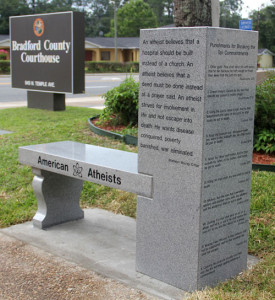In the third post in this series, I included a quote from Dr. Carolyn Parco in which she lamented science’s lack of ecclesiastical benefits. It looks like her prayers wishes might be answered. The Associated Press recently published an article detailing the spread of Atheist “mega-churches” called “Sunday Assemblies.”
Sunday Assembly co-founder and comedian Sanderson Jones is quoted in the article. His perspective is an unintended but stinging indictment of American church priorities.
If you think about church, there’s very little that’s bad. It’s singing awesome songs, hearing interesting talks, thinking about improving yourself and helping other people — and doing that in a community with wonderful relationships.
It is sobering to think that our churches have become so socially conscious in their behavior that leaving God out hardly changes the experience. Is it possible that God is subtly being treated as a “bad part”?
The article continues,
The inaugural Sunday Assembly in Los Angeles attracted several hundred people bound by their belief in non-belief.
Notice the implied contradiction in the phrase “belief in non-belief.” This is a key point in my series on natural humanism as religion: everybody has a faith-based belief about the supernatural, even if it’s the belief that no supernatural exists.
Similar gatherings… have drawn hundreds of atheists seeking the camaraderie of a congregation without religion or ritual.
While numerous humanists have commented on personal satisfaction with the scale and grandeur of the universe and their being a part of it, the attendees of “Sunday Assembly” can tell that something is missing. This missing element is worship. Humans are created to worship, but the universe is a cold, vacuous, and uncomprehending deity. These congregationalist seek ritual as a substitute for worship. The author of the article writes that they seek camaraderie without religion or ritual, but he is mistaken. In the same article he quotes a sociology professor who contradicts him.
‘There’s something not OK with appropriating all of this religious language, imagery and ritual for atheism,’ said Michael Luciano, a self-described atheist.
Luciano understands that ritual and religion is exactly what these people are seeking. He’s also right that it won’t help them. Religious ritual is empty without a worthy subject to worship. Without God, it becomes exactly what they accuse it of being; habits for emotional stabilization, devoid of personality. Like an infant’s pacifier, it may give them a temporary sense of comfort, but there’s no real nourishment.
As Christians, our nourishment is based on studying, remembering, and praising the work of God through Jesus Christ our Lord, and then imitating that work to others. All of our church behavior should reflect these principles. If not, we risk becoming another “Sunday Assembly.”
